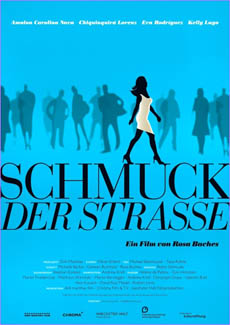
Starts May 12
 This documentary was filmed in the St. Pauli section of Hamburg, Germany, near the Reeperbahn at Schmuckstrasse. The directors follow the lives of Spanish-speaking, Latin American transvestites who live in apartments at Schmuckstrasse. Kelly Lugo, Chinquinguíra Lorenz and Eva Rodriquez are beautiful; they have long dark hair and even longer legs, which they parade in short shorts. They seem to earn their keep as prostitutes in Hamburg’s red-light district. They sew new clothes and spend hours fixing their hair, both at home and at the hairdresser’s. They welcome Amaloa Vara who used to be their colleague, but who is now only visiting after having married. A bit older than the others, she talks about her sex-change operation, which she underwent “for love.” Philosophically, they say that they are privileged to be women with a penis – a mythical being. They are close to their families whom they have left behind and often call their mothers on the phone. They make plans: to fall in love, to become a model, to rent a row house in a conservative part of town, to apply for German citizenship.
This documentary was filmed in the St. Pauli section of Hamburg, Germany, near the Reeperbahn at Schmuckstrasse. The directors follow the lives of Spanish-speaking, Latin American transvestites who live in apartments at Schmuckstrasse. Kelly Lugo, Chinquinguíra Lorenz and Eva Rodriquez are beautiful; they have long dark hair and even longer legs, which they parade in short shorts. They seem to earn their keep as prostitutes in Hamburg’s red-light district. They sew new clothes and spend hours fixing their hair, both at home and at the hairdresser’s. They welcome Amaloa Vara who used to be their colleague, but who is now only visiting after having married. A bit older than the others, she talks about her sex-change operation, which she underwent “for love.” Philosophically, they say that they are privileged to be women with a penis – a mythical being. They are close to their families whom they have left behind and often call their mothers on the phone. They make plans: to fall in love, to become a model, to rent a row house in a conservative part of town, to apply for German citizenship.
This is a well-made film in beautiful colors about a slice of life just 30-minute subway ride from my house. Their stories remind me of similar lives which I have seen in documentaries about transvestites in India, the hijras. All of them have the same dreams as anyone else and plan their lives as best they can. They are normal people except for one small difference. The two directors, Rosa Baches and Dirk Manthey, both grew up in Spain, so could converse in Spanish.
Comment:
It’s interesting that these transvestites live in Schmuckstrasse, since “Schmuck” means “jewel.” According to my friend who teaches English at Hamburg University, in Yiddish, calling someone “such a schmuck” would translate to “such a dick.” This makes sense because “Schmuck” can also mean “the family jewels” which, of course, are someone’s private parts – something that these girls definitely have enough of.
